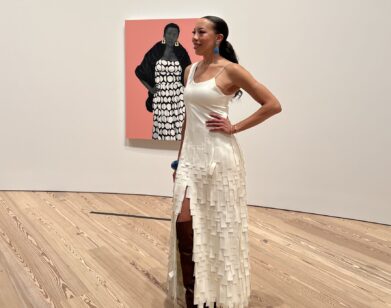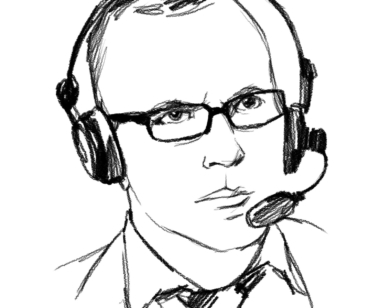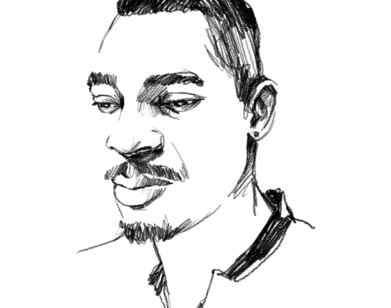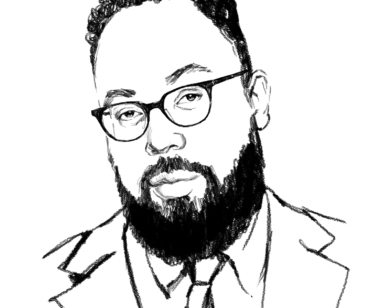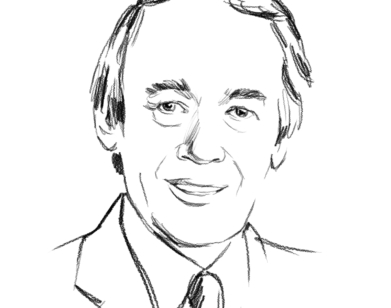Ask a Sane Person: Lawrence Wright on the Sexual Bacchanal That Never Came
 The screenwriter, author, and Pulitzer Prize–winning journalist Lawrence Wright has made attention-to-detail his calling card. From his intricate retelling of the rise of Al-Qaeda in The Looming Tower, to the astonishing revelations in his Scientology tell-all Going Clear, the New Yorker staff writer leaves no stone unturned in his research. That’s what makes his new novel The End of October, about a global pandemic that cripples society, so compelling—and so terrifying.
The screenwriter, author, and Pulitzer Prize–winning journalist Lawrence Wright has made attention-to-detail his calling card. From his intricate retelling of the rise of Al-Qaeda in The Looming Tower, to the astonishing revelations in his Scientology tell-all Going Clear, the New Yorker staff writer leaves no stone unturned in his research. That’s what makes his new novel The End of October, about a global pandemic that cripples society, so compelling—and so terrifying.
INTERVIEW: Where are you and how long have you been isolating?
LAWRENCE WRIGHT: I’m at home, in Austin. The last time I went out, other than for exercise or to pick up a curbside meal, was March 12.
INTERVIEW: What has this pandemic confirmed or reinforced about your view of society?
WRIGHT: Our government is chaotic, incompetent, and lacks compassion. It has behaved as badly as I expected, or worse.
INTERVIEW: What has this pandemic altered about your view of society?
WRIGHT: I’m impressed with the solidarity of individuals to isolate themselves, at great personal cost—financially, socially, emotionally, and spiritually—all for the sake of protecting themselves and our communities.
INTERVIEW: What is the worst-case scenario for the future?
WRIGHT: Covid-19 mutates over the summer and comes back in the fall with greater lethality—like the 1918 Spanish flu. October 1918 was the most lethal month in American history.
INTERVIEW: What good can come out of this lockdown? Are there any reasons to hope?
WRIGHT: Like a war or a depression, a pandemic provides an X-ray of society. We can see clearly the flaws in our government and our institutions. It gives us the opportunity to mend the dangerous shortcomings before an even more challenging crisis comes.
INTERVIEW: Do you predict an outcome of a more inclusive globalism or more nationalism and isolationism?
WRIGHT: I had hoped that a pandemic would bring nations together to fight it, but it seems that the forces of isolation and nationalism outweigh the good that global consensus would provide.
INTERVIEW: More socialism or more authoritarianism?
WRIGHT: China’s success provides an excuse for governments to emulate its system, but the outcry of Chinese people early in the pandemic showed how provisional the popular support of the communist party is. Authoritarian governments will use the opportunity to consolidate more power. Weak governments will be further weakened, and may turn into failed states. Democracies will struggle. “Socialism” in the form of increased government bailouts, better health care, and a broader safety net will find greater appeal.
INTERVIEW: How will world governments be remembered for their responses to the pandemic?
WRIGHT: Every government will be challenged. Statistics are useful measurements of success and failure. “How many people were sickened?” for instance. “How many died?” The U.S. has 4% of the world’s population but is closing in on 30% of the deaths. How many people lost their jobs? How many were able to get back to work within a year? In Democratic countries, elections will provide answers to these questions. Where there are authoritarian regimes, discontent will make itself felt, possibly leading to insurgency and increased repression. Weak countries will become more chaotic and susceptible to terrorism.
INTERVIEW: What has been your daily routine during this time?
WRIGHT: My life has changed less than most. I work at home. It’s frustrating not being able to get out to report, but I’ve learned to use Zoom and other platforms. My wife and I walk every morning, and I sometimes run as well. We have a lap pool and that helps immensely. I write during the day, go for a swim, practice piano, then we eat and watch TV or read. Once a week I have a virtual Pilates class. On the weekends I take a piano lesson via FaceTime. My usual Monday morning breakfast group, which has been gathering for 30 years, now meets on Zoom.
INTERVIEW: Describe the current state of your hair.
WRIGHT: Better than it was. My haircutter consulted on FaceTime as my wife gave me my first trim about a month ago. I was about two weeks away from a man bun.
INTERVIEW: On a scale of 1 to 10, what level is your level of panic about the current state of the world?
WRIGHT: Oh, I’m worried, all right. I don’t want to put a number on it, but the amount of dysfunction and incompetence on display right now is very dismaying. The blame game among nations is dangerous. There was a terrible missed opportunity for world powers to unite to fight our common enemy; instead, the pandemic has only deepened hostility. I take some comfort in the friendliness of our new pedestrian culture as we walk through the neighborhood. There’s still some civility in the world.
INTERVIEW: What is your ultimate novel, film, and album for self-isolation?
WRIGHT: I’m going to reread Moby Dick. I’ll watch almost any Nora Ephron movie again and again. The discord of Thelonious Monk seems oddly appropriate for the era.
INTERVIEW: Who would be your nightmare person to spend a month of lockdown with?
WRIGHT: Don Trump, Jr.
INTERVIEW: What thinker have you taken comfort in of late and why?
WRIGHT: Michelle Obama. She’s resolute and immune to despair.
INTERVIEW: If 2020 were a song, which song would it be?
WRIGHT: “Mean Old World” by Sam Cooke.
INTERVIEW: Where did we go wrong? Like, what was the exact moment?
WRIGHT: The invasion of Iraq. We lost the opportunity to become a better country.
INTERVIEW: Which (admittedly totally unqualified) celebrity would you trust with the planet’s future?
WRIGHT: So far, Matthew McConaughey has done the best job of being an inspiring celebrity in hard times.
INTERVIEW: If you could stop time at one particular moment in your life, which moment would it be?
WRIGHT: The moment my future wife walked into Archeology 301 at Tulane University.
INTERVIEW: What’s one skill we should all learn while in quarantine?
WRIGHT: Pick up an instrument. I didn’t start learning the piano until I was 38 ½, in order to play “Great Balls of Fire” on my 40th birthday. Now I’m in a band, or will be again, if we ever go outside again and the clubs are open.
INTERVIEW: State vs. federal? Who should have the power to control the movements and reopening of economies for its people?
WRIGHT: States have a better sense of local conditions, but they need the guidance and financial backing of the federal government.
INTERVIEW: Is this circumstance a win for technology and the virtual world or for the value of real human contact?
WRIGHT: I used to think that the moment lockdown ended there would be a three-week sexual bacchanal, but people seem a little more cautious of each other than I expected. No doubt people will be more isolated in the future, working at home, avoiding crowds, continuing to do takeout, getting goods delivered. The amount of social interaction will diminish, but maybe be more cherished.
INTERVIEW: What prevents you from giving up hope in the human race?
WRIGHT: Not a lot.

